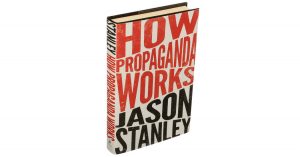Michiko Kakutani reviews a book that is timely because it comes likes an alarm clock, How Propaganda Works, by Professor Jason Stanley. It is not boring, so promise you will not be needing to hit the snooze button; but, in fact, the book will keep you engaged while serving as a prophylaxis against the opposing problem, zealously rallying behind the slogans of a demagogue. Donald Trump’s propaganda campaign evidently began (with a name like that) from the day he was born.
Mr. Stanley begins by offering a definition of propaganda that extends beyond dictionary descriptions of biased or misleading information used to promote a particular political cause or point of view. Propaganda is characteristically part of the mechanism, he writes, by which people become deceived about how best to realize their goals, and hence deceived from seeing what is in their own best interests. This is achieved by various time-tested means by appealing to the emotions in such a way that rational debate is sidelined or short-circuited; by promoting an insider/outsider dynamic that pollutes the broader conversation with negative stereotypes of out-of-favor groups; and by eroding community standards of reasonableness that depend on norms of mutual respect and mutual accountability.
This might illumine both the successes and failures of the Sanders campaign, puzzling because it appealed to many of the same grievances that propelled Trump to the Oval Office, while providing solutions that would have actually helped to alleviate them.’Feel the Bern’ might have been clever, but what herd of sheep might that help to mobilize (which aren’t already) other than stoners? ‘Make America Great Again’, as propaganda, is more effective, which goes to show that propaganda doesn’t have to be clever. In fact, it should never be too clever since then the sheep might get suspicious. It should sound not like a baby’s first word, but first complaint. And it should say succinctly what people already feel an inkling of. If there was a God it would be a nice sort of surprise to think he looked like me.
Read his full post at The New York Times

